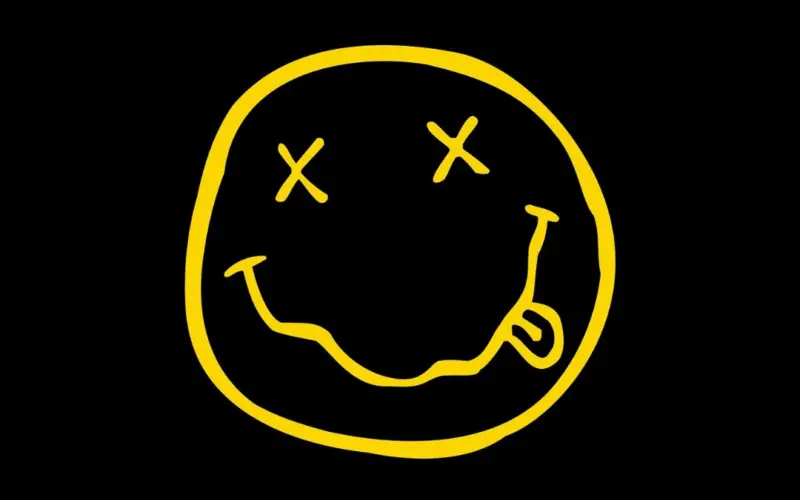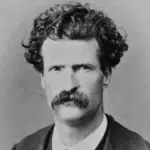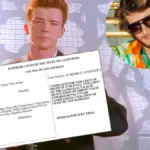A new complaint against former Geffen Records employee Robert Fisher seeks a declaration that Nirvana is the rightful copyright owner of the band’s iconic smiley face logo design.
The long-running legal battle over the Nirvana “smiley face” design and “happy face” t-shirt has been anything but smiley and happy, and it’s just taken another turn. In a new federal court filing on November 11 in Los Angeles, Nirvana LLC sued Robert Fisher, a former employee of Geffen Records, for declaratory relief in a feud over ownership of the band’s iconic logo.
Fisher first surfaced last year in the middle of ongoing litigation between Nirvana and Marc Jacobs International. He sought to intervene in the case in September, claiming that he was the one who created the design that Nirvana accuses the fashion designer of infringing in a high end t-shirt line. Nirvana contends the smiley face was actually designed by its former lead singer, Kurt Cobain, who died tragically in 1994.

The Happy Face T-Shirt and the Smiley Face Design
The smiley face design was first featured on a happy face t-shirt created in July 1991 to promote Nirvana’s groundbreaking “Nevermind” album. Believing that Kurt Cobain had designed the shirt (and that he did so on behalf of his employer, Nirvana), the band obtained copyright registration for the t-shirt design in 1993.

According to Nirvana’s new complaint, defendant Robert Fisher was employed in the early 1990s as an art director by Nirvana’s record label Geffen, and was assigned to work on Nirvana-related projects.
Fisher has been aware of Nirvana’s ubiquitous exploitation of the happy face t-shirt and underlying smiley face design for nearly three decades, without objection. But In November 2019, Fisher claimed for the first time, that he, and not Cobain, had created the design.
In August 2020, Fisher registered a copyright in the design. He has since taken the position that Nirvana’s exploitation of the smiley face was pursuant to an “implied license” that he plans to terminate effective January 1, 2021—at which point any further exploitation by Nirvana would infringe his copyright.
Meanwhile, the Marc Jacobs litigation has been the subject of dueling summary judgment motions, with the fashion designer claiming last week that it isn’t liable to Nirvana for infringement. In support of its motion, Marc Jacobs argues that Fisher owns the copyright in the design.

Geffen, for its part, has credited Cobain with creating the happy face t-shirt and smiley face design. In January, UMG Recordings, Geffen’s successor-in-interest, executed an “acknowledgement” of Nirvana’s ownership. That document also purported to retroactively assign to Nirvana any copyright interests Geffen may have otherwise retained.
Who Created the Nirvana Smiley Face?
The underlying question of who created the smiley face design—Cobain or Fisher—may, unfortunately, never be answered definitively, because the person who could best advocate for Nirvana’s position is no longer alive. Cobain’s former bandmates Dave Grohl and Krist Novaselic were both deposed in the Marc Jacobs lawsuit last year, and neither could definitively say that Cobain was the designer.


The whole smiley face affair has certainly become messy from a factual perspective. However, as a matter of copyright law, it may not make a difference whether the design was created by Cobain or Fisher.
Let’s assume, for the sake of argument, that Fisher did draw the original design. He was working for Geffen at the time, in the label’s art department, specifically assigned to Nirvana-related projects. If the work he claims to have done in connection with the happy face t-shirt or smiley face design was within the scope of his employment, the copyright would have been owned by Geffen in the first instance as a “work made for hire.”
Works for Hire by Employees
I talked a bit about employee-created works made for hire in a recent post about a copyright lawsuit Yoko Ono filed against John Lennon’s former assistant. Courts consider several factors in determining whether an employee’s work is “within the scope” of employment. In the Ninth Circuit, where Nirvana’s case will be decided, the court will examine whether the work is of the kind the employee was employed to perform, whether it occurred within the employee’s authorized hours and space limits, and whether performance of the work was done, at least in part, to serve the employer.
Here, Nirvana has a pretty good work for hire argument on the facts. Based on deposition testimony Fisher gave in the Marc Jacobs case, he worked for Geffen as an art director, a position which required him to create graphic art to promote Geffen artists. Fisher testified that when he was asked to make the Nirvana happy face t-shirt, he understood it was to be used for promotional and retail purposes.
While Fisher testified that he doesn’t remember where he was physically when he allegedly created the smiley face drawing, he said he “probably” created the happy face t-shirt design at his Geffen office, and that he remembers using Geffen’s equipment to complete the design. As soon as the t-shirt design was created, it was used in various ways to promote Nirvana’s 1991 “Nevermind” album.
Geffen’s Acknowledgment and “Retroactive” Assignment
If Fisher did create the smiley face design and happy face t-shirt as a work made for hire, Geffen would have owned the copyright in the first instance, not Nirvana. That’s the reason Nirvana is seeking to rely on Geffen’s so-called “retroactive assignment” as a backup argument in the event Cobain didn’t actually create the design.

An interesting issue raised by the Geffen assignment is whether Nirvana can rely on it to maintain its copyright infringement claim against Marc Jacobs. The allegedly-infringing Marc Jacobs designs predated Geffen’s execution of the acknowledgement document, although the agreement purports to be retroactive.
Section 204 of the Copyright Act requires that copyright transfers be made via signed writings as opposed to orally. Here, there wasn’t a written assignment for the first 25+ years of the smiley face design’s existence.
That said, both the Ninth and Second Circuits have recognized and upheld what Nirvana has attempted to do in this case, which is to use a signed writing to retroactively confirm a prior agreement that wasn’t reduced to writing at the time. If both the assignor (here, Geffen) and assignee (Nirvana) don’t dispute the existence or validity of a previous oral agreement, a third party (Marc Jacobs) generally won’t be permitted to argue that the subsequent written transfer was invalid in order to excuse its own infringement. If you’re interested, a couple of notable cases on the subject are Magnuson v. Video Yesteryear from the Ninth Circuit and Eden Toys v. Florelee Undergarment Co. out of the Second Circuit.
There’s another Second Circuit case, Davis v. Blige, that some people have read broadly to suggest that retroactive copyright assignments are invalid, but that overstates the law a bit. More properly interpreted, Davis prevents one joint owner of a copyright from transfering its share of the copyright to an alleged infringer in order to prevent the other co-owner from suing for an infringement claim that’s already accrued.
It’s also important to note that if there’s a dispute about the existence or terms of a purported oral assignment between an assignor and assignee that one party argues was later reduced to writing, a court is likely to reject an after-the-fact transfer as opposed to a contemporaneous one. But again, that’s not the case here vis-à-vis Geffen and Nirvana.
The bottom line is that learning who, as between Kurt Cobain and Robert Fisher, created the Nirvana smiley face design is certainly important for posterity purposes. But for legal purposes, it may prove unnecessary.
You can read a copy of Nirvana’s new complaint against Robert Fisher below. This is also a good time to remind you to subscribe to the Copyright Lately weekly newsletter if you haven’t yet. Every Sunday I send out exclusive content that’s not on the site.
View Fullscreen





